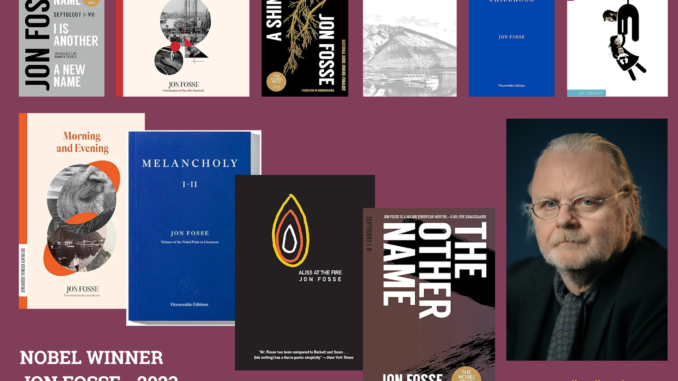
Jon Fosse: A Nobel Laureate Bridging Cultures Through Silence and Prose
On October 5, 2023, Norwegian writer and playwright Jon Fosse was awarded the Nobel Prize in Literature for his “innovative plays and prose that give voice to the unsayable.” This honor places him among the world’s most distinguished literary figures, recognizing his unique ability to capture the depths of human existence through sparse language and minimalist storytelling. Fosse’s work, deeply rooted in Nordic literary traditions, has transcended national borders, resonating with audiences and cultures worldwide.
A Literary Voice from Norway to the World
Born in Haugesund, Norway, in 1959, Fosse’s literary journey spans over four decades, covering a diverse body of work including novels, plays, poetry, essays, and children’s books. His debut novel, Raudt, svart (Red, Black), published in 1983, introduced readers to his introspective and poetic style—one that would later define his literary career.
Fosse’s minimalist prose and rhythmic use of language have drawn comparisons to playwrights like Samuel Beckett and poets like Rainer Maria Rilke. However, his work is uniquely Norwegian, reflecting the landscapes, cultural solitude, and philosophical depth of his homeland. At the same time, it possesses a universality that has made him one of the most performed contemporary playwrights in the world. His plays have been translated into over fifty languages, and his influence extends far beyond Scandinavia, finding a home in diverse theatrical traditions across Europe, Asia, and the Americas.
Weaving Multicultural Threads into a Singular Vision
Despite writing in Nynorsk, a lesser-used Norwegian written standard, Fosse’s impact is anything but regional. His works have been embraced in Germany, France, Japan, China, and Latin America—places where audiences find echoes of their own cultural and existential struggles in his storytelling. His themes—love, death, longing, and human connection—transcend linguistic and cultural barriers, drawing together global audiences who recognize their own stories within his characters’ silences and pauses.
In the multicultural landscape of modern literature, Fosse’s success demonstrates how deeply local storytelling can become profoundly universal. The stillness in his dialogue, the haunting atmosphere of his prose, and his ability to portray human emotions through ellipses and absences make him a writer who speaks to a shared human experience. In Japan, where minimalist aesthetics in art and literature are deeply appreciated, his plays have found particular acclaim. Similarly, his work resonates in cultures with strong oral storytelling traditions, where meaning is often found as much in what is left unsaid as in what is spoken.
The Spiritual and Philosophical Dimensions
Fosse’s writing is deeply introspective, often blurring the boundaries between the physical and the metaphysical. His Catholic faith, to which he converted in 2012, subtly permeates his later works, adding layers of spirituality and existential contemplation. While some of his stories deal with the everyday, many also evoke a sense of the mystical—suggesting an unseen world that exists alongside our own. This interplay between the tangible and the intangible finds echoes in the storytelling traditions of many cultures, from Buddhist koans to Sufi poetry to indigenous oral histories.
By addressing the fundamental aspects of human experience—loneliness, love, the passage of time—Fosse connects with readers and audiences across cultures, reminding them that, despite differences in language or geography, certain truths remain universal.
A Nobel Prize That Recognizes Cultural Bridges
The Nobel Prize in Literature has long recognized writers who bring new dimensions to global storytelling. In awarding Fosse, the Swedish Academy has not only honored a Norwegian writer but also underscored the importance of literature that can cross cultural and linguistic boundaries. His work reminds us that literature is not confined by geography, and that silence, as much as language, is a powerful tool for expressing human truths.
In an increasingly globalized yet fragmented world, Fosse’s Nobel Prize win is a testament to the power of literature to create bridges between cultures. His success challenges the notion that stories must be loud or expansive to be impactful; sometimes, it is in the quietest voices that we hear the deepest truths.
